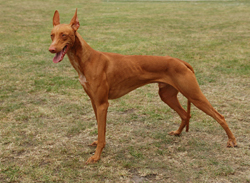Pharaoh Hounds are slender, medium-sized dogs with glossy coats that range in color from tan to chestnut to red. White markings can appear on the chest, toes, tail tip, and on the center line of the breed's face. The eyes are oval shaped and dark, and the ears are long and erect. These dogs have flesh-colored noses, straight backs, lean necks, and low-hanging tails. Pharaoh Hounds measure 21 to 25 inches tall at the shoulder and weigh 40 to 60 pounds.
Sociable, loving, and athletic, Pharaoh Hounds get along superbly with children, although they tend to be reserved around unfamiliar people. If given enough daily exercise, they do well in most living situations, including apartments.
Playful, affectionate, vocal, and well mannered, Pharaoh Hounds make great companions for families with children. They are intelligent and friendly, and they need regular activity to remain physically and mentally healthy. These dogs do best in homes with securely fenced yards.
Pharaoh Hounds are known for blushing when happy or excited. Their noses and ears take on a deep red color.
Sociable, loving, and athletic, Pharaoh Hounds get along superbly with children, although they tend to be reserved around unfamiliar people. If given enough daily exercise, they do well in most living situations, including apartments. They are calm indoors, do well with other dogs, and are eager to please.
Pharaoh Hounds are intelligent and affectionate. They can also be goofy at times and most have a great sense of humor. Anyone sharing a house with one of these dogs will need a sense of humor, too. These dogs are good at entertaining themselves, but they can get into trouble if they become bored and start looking for ways to amuse themselves.
These dogs need at least 20 to 30 minutes each day on a leash; they'll benefit from free play in a securely fenced yard, as well. They also enjoy playing games with older children, but they should be supervised at all times due to their rambunctious natures. Pharaoh Hounds should live indoors and they should sleep in a warm, soft pet bed. They do not do well when left outdoors for long periods.
Pharaoh Hounds are generally healthy and not troubled by serious genetic disease. However, there is no guarantee that any individual dog will be free of serious illness or genetic condition. Obtaining these dogs from a reputable source is essential.
Hypothyroidism, skin and food allergies, stomach ailments, and certain intestinal problems are common in Pharaoh Hounds. These dogs are also prone to flaky, dry skin, especially during the cold winter months. Coat moisturizers and nutritional supplements may help. Running a humidifier inside the home is also beneficial.
With a healthy diet, routine veterinary care, regular exercise, and timely vaccinations, Pharaoh Hounds can live up to 14 years.
Pharaoh Hounds are intelligent dogs that learn quickly and are eager to please. These traits make them highly trainable. They do well with positive reinforcement, including play, praise, and food rewards, but they hate repetition and will tune out if training sessions are boring or too long.
It's a good thing these dogs respond well to training, because they can be difficult without it. Pharaoh Hounds are prone to several negative behaviors that may make them hard to live with. These dogs are known to steal food from counters, wastebaskets, and even plates. They also have a tendency to chase moving objects and small animals at every opportunity, and some enjoy digging up flowerbeds. Pharaoh Hounds also bark a lot, and their nuisance barking can quickly get out of hand without training that teaches them when it is appropriate to open their mouths and when it isn't.
Even though Pharaoh Hounds can rarely resist chasing other animals, these dogs get along with most cats if raised with them. Still, it is always a good idea to supervise them when together.
The Pharaoh Hound's short, glossy coat is low maintenance and requires only weekly brushing. Brushing with a rubber curry brush will remove loose and dead hair while preventing tangles and mats. After brushing, a gentle polish with a chamois cloth will improve shine. These dogs don't shed much, but an extra brushing or two each week can control any hair loss to keep it off clothing and furniture.
These dogs are generally very clean and rarely need baths. If the Pharaoh Hound rolls around in something stinky or sticky, a lukewarm washing with a pH-balanced canine shampoo will gently clean the coat without triggering skin dryness or irritation. Rinsing thoroughly is important.
The teeth need brushing every day or as often as possible with a canine toothpaste and toothbrush. The addition of drinking water additives and dental chew treats will help prevent tartar buildup between brushings. This is an important part of avoiding gum disease and tooth decay. Additionally, the nails should be trimmed every couple of weeks, and the ears need checking and cleaning once weekly. Excess wax accumulation and signs of infection should be reported to a veterinarian right away.
One of the oldest domesticated dog breeds, Pharaoh Hounds date back to 3,000 B.C. These dogs originated in ancient Egypt and look very similar to the images of the jackal god, Anubis. The breed was likely carried by the Phoenicians to the Mediterranean island of Malta from Egypt.
Once on Malta, the breed became isolated from the rest of the world. Pharaoh Hounds were raised to be rabbit dogs, and they flourished in the role. Breeding was done very carefully for thousands of years.
In the 1960s, Pharaoh Dogs were rediscovered and taken to other countries around the world, including England. The breed was first imported to the United States in 1967. In 1979, Pharaoh Hounds were declared the national dog of Malta. Today, these dogs are primarily kept as companion animals.
The Pharaoh Hound was officially recognized by the American Kennel Club in 1983.

